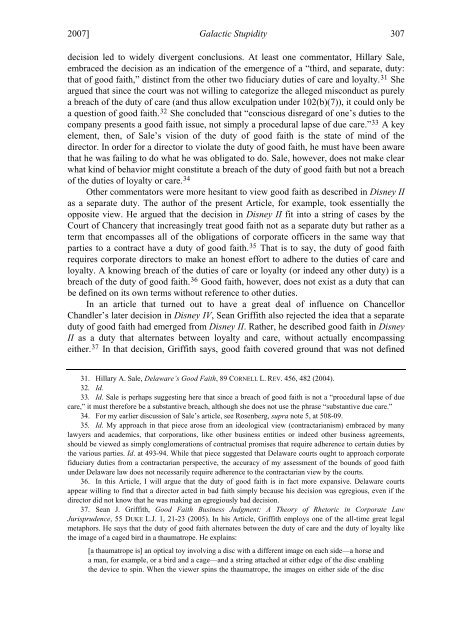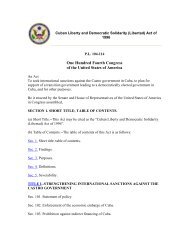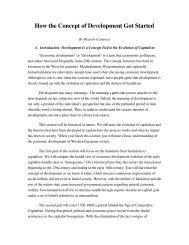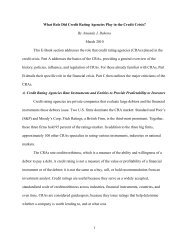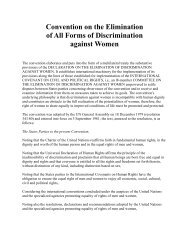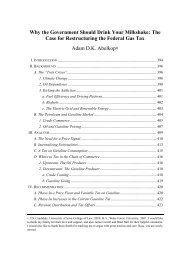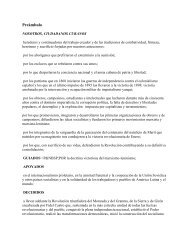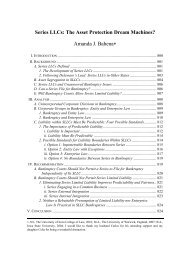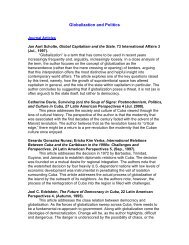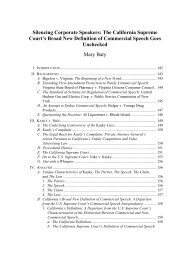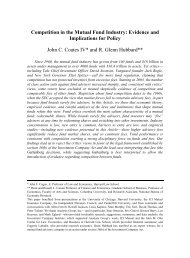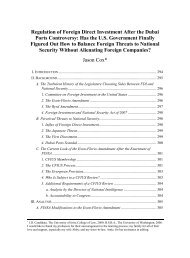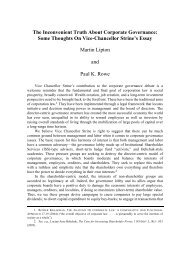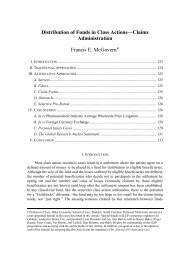Galactic Stupidity and the Business Judgment Rule - College of Law
Galactic Stupidity and the Business Judgment Rule - College of Law
Galactic Stupidity and the Business Judgment Rule - College of Law
Create successful ePaper yourself
Turn your PDF publications into a flip-book with our unique Google optimized e-Paper software.
2007] <strong>Galactic</strong> <strong>Stupidity</strong> 307<br />
decision led to widely divergent conclusions. At least one commentator, Hillary Sale,<br />
embraced <strong>the</strong> decision as an indication <strong>of</strong> <strong>the</strong> emergence <strong>of</strong> a “third, <strong>and</strong> separate, duty:<br />
that <strong>of</strong> good faith,” distinct from <strong>the</strong> o<strong>the</strong>r two fiduciary duties <strong>of</strong> care <strong>and</strong> loyalty. 31 She<br />
argued that since <strong>the</strong> court was not willing to categorize <strong>the</strong> alleged misconduct as purely<br />
a breach <strong>of</strong> <strong>the</strong> duty <strong>of</strong> care (<strong>and</strong> thus allow exculpation under 102(b)(7)), it could only be<br />
a question <strong>of</strong> good faith. 32 She concluded that “conscious disregard <strong>of</strong> one’s duties to <strong>the</strong><br />
company presents a good faith issue, not simply a procedural lapse <strong>of</strong> due care.” 33 A key<br />
element, <strong>the</strong>n, <strong>of</strong> Sale’s vision <strong>of</strong> <strong>the</strong> duty <strong>of</strong> good faith is <strong>the</strong> state <strong>of</strong> mind <strong>of</strong> <strong>the</strong><br />
director. In order for a director to violate <strong>the</strong> duty <strong>of</strong> good faith, he must have been aware<br />
that he was failing to do what he was obligated to do. Sale, however, does not make clear<br />
what kind <strong>of</strong> behavior might constitute a breach <strong>of</strong> <strong>the</strong> duty <strong>of</strong> good faith but not a breach<br />
<strong>of</strong> <strong>the</strong> duties <strong>of</strong> loyalty or care. 34<br />
O<strong>the</strong>r commentators were more hesitant to view good faith as described in Disney II<br />
as a separate duty. The author <strong>of</strong> <strong>the</strong> present Article, for example, took essentially <strong>the</strong><br />
opposite view. He argued that <strong>the</strong> decision in Disney II fit into a string <strong>of</strong> cases by <strong>the</strong><br />
Court <strong>of</strong> Chancery that increasingly treat good faith not as a separate duty but ra<strong>the</strong>r as a<br />
term that encompasses all <strong>of</strong> <strong>the</strong> obligations <strong>of</strong> corporate <strong>of</strong>ficers in <strong>the</strong> same way that<br />
parties to a contract have a duty <strong>of</strong> good faith. 35 That is to say, <strong>the</strong> duty <strong>of</strong> good faith<br />
requires corporate directors to make an honest effort to adhere to <strong>the</strong> duties <strong>of</strong> care <strong>and</strong><br />
loyalty. A knowing breach <strong>of</strong> <strong>the</strong> duties <strong>of</strong> care or loyalty (or indeed any o<strong>the</strong>r duty) is a<br />
breach <strong>of</strong> <strong>the</strong> duty <strong>of</strong> good faith. 36 Good faith, however, does not exist as a duty that can<br />
be defined on its own terms without reference to o<strong>the</strong>r duties.<br />
In an article that turned out to have a great deal <strong>of</strong> influence on Chancellor<br />
Ch<strong>and</strong>ler’s later decision in Disney IV, Sean Griffith also rejected <strong>the</strong> idea that a separate<br />
duty <strong>of</strong> good faith had emerged from Disney II. Ra<strong>the</strong>r, he described good faith in Disney<br />
II as a duty that alternates between loyalty <strong>and</strong> care, without actually encompassing<br />
ei<strong>the</strong>r. 37 In that decision, Griffith says, good faith covered ground that was not defined<br />
31. Hillary A. Sale, Delaware’s Good Faith, 89 CORNELL L. REV. 456, 482 (2004).<br />
32. Id.<br />
33. Id. Sale is perhaps suggesting here that since a breach <strong>of</strong> good faith is not a “procedural lapse <strong>of</strong> due<br />
care,” it must <strong>the</strong>refore be a substantive breach, although she does not use <strong>the</strong> phrase “substantive due care.”<br />
34. For my earlier discussion <strong>of</strong> Sale’s article, see Rosenberg, supra note 5, at 508-09.<br />
35. Id. My approach in that piece arose from an ideological view (contractarianism) embraced by many<br />
lawyers <strong>and</strong> academics, that corporations, like o<strong>the</strong>r business entities or indeed o<strong>the</strong>r business agreements,<br />
should be viewed as simply conglomerations <strong>of</strong> contractual promises that require adherence to certain duties by<br />
<strong>the</strong> various parties. Id. at 493-94. While that piece suggested that Delaware courts ought to approach corporate<br />
fiduciary duties from a contractarian perspective, <strong>the</strong> accuracy <strong>of</strong> my assessment <strong>of</strong> <strong>the</strong> bounds <strong>of</strong> good faith<br />
under Delaware law does not necessarily require adherence to <strong>the</strong> contractarian view by <strong>the</strong> courts.<br />
36. In this Article, I will argue that <strong>the</strong> duty <strong>of</strong> good faith is in fact more expansive. Delaware courts<br />
appear willing to find that a director acted in bad faith simply because his decision was egregious, even if <strong>the</strong><br />
director did not know that he was making an egregiously bad decision.<br />
37. Sean J. Griffith, Good Faith <strong>Business</strong> <strong>Judgment</strong>: A Theory <strong>of</strong> Rhetoric in Corporate <strong>Law</strong><br />
Jurisprudence, 55 DUKE L.J. 1, 21-23 (2005). In his Article, Griffith employs one <strong>of</strong> <strong>the</strong> all-time great legal<br />
metaphors. He says that <strong>the</strong> duty <strong>of</strong> good faith alternates between <strong>the</strong> duty <strong>of</strong> care <strong>and</strong> <strong>the</strong> duty <strong>of</strong> loyalty like<br />
<strong>the</strong> image <strong>of</strong> a caged bird in a thaumatrope. He explains:<br />
[a thaumatrope is] an optical toy involving a disc with a different image on each side—a horse <strong>and</strong><br />
a man, for example, or a bird <strong>and</strong> a cage—<strong>and</strong> a string attached at ei<strong>the</strong>r edge <strong>of</strong> <strong>the</strong> disc enabling<br />
<strong>the</strong> device to spin. When <strong>the</strong> viewer spins <strong>the</strong> thaumatrope, <strong>the</strong> images on ei<strong>the</strong>r side <strong>of</strong> <strong>the</strong> disc


